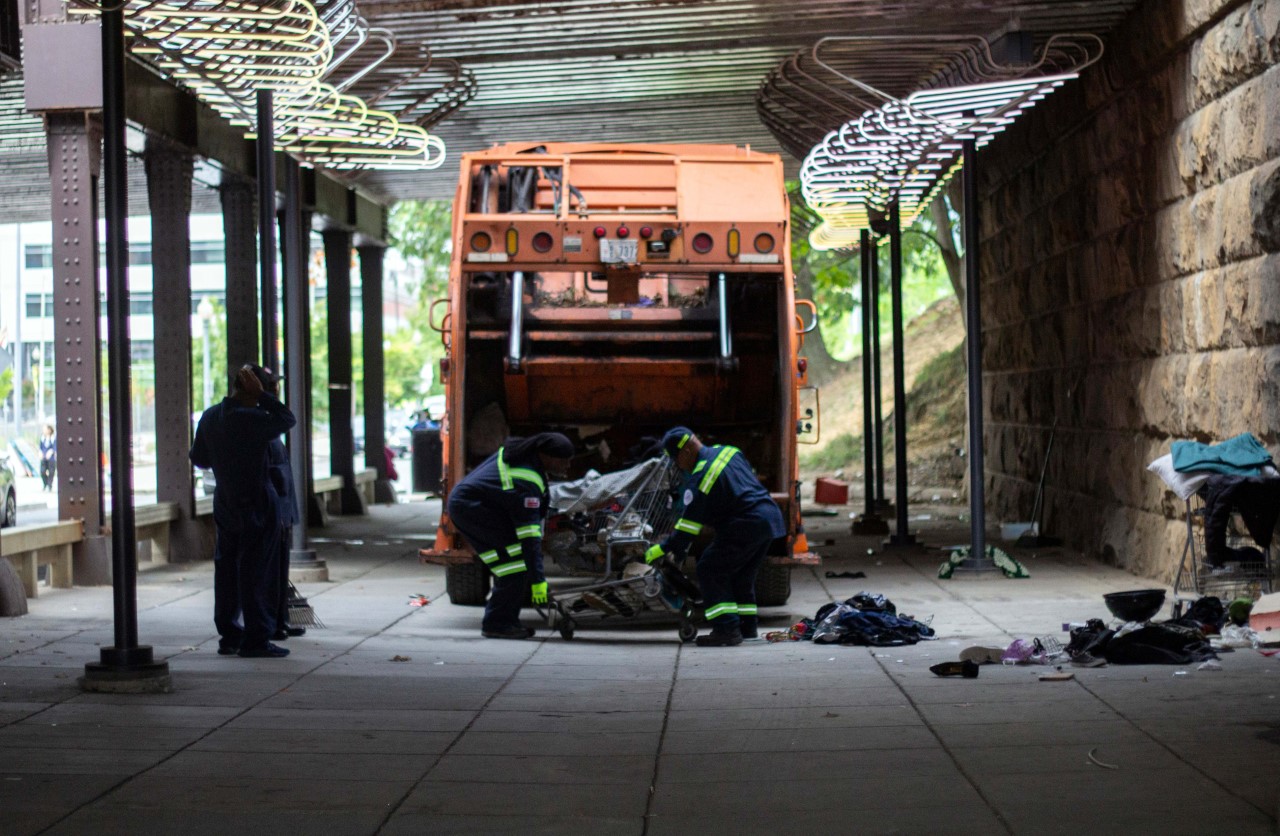CDC Says ‘No’ to Clearing Homeless Encampments During COVID-19 Outbreak

Howard Center for Investigative Journalism
People living in outdoor homeless encampments should not be evicted during the outbreak of COVID-19 unless they can be moved to individual housing units, the Centers for Disease Control and Prevention recommended late Sunday.
Living outside for prolonged periods has long been associated with greater health risks. But the recommendations posted on the CDC’s website said that clearing the tents and temporary structures would likely increase the risk of spreading the virus because people would scatter to other parts of the community.
The CDC also recommended that people living in encampments set up at least 12 feet apart and that governments make sure that restrooms are always available nearby. They also said those restrooms should be stocked and have running water to enable people living in encampments to wash their hands with soap.
The recommendations are similar to those made by the National Law Center on Homelessness & Poverty last week. That 30-year-old legal organization focuses on ending and preventing homelessness. Its legal director, Eric Tars, said following those recommendations will save lives.
“Not just the lives of the people who are experiencing homelessness directly. It’s for all of us,” Tars said. “Every hospital bed that isn’t being occupied by someone who is experiencing homelessness is a bed that is available for your brother, your mother, your sister. We really are in this together.”
Tars is also calling on Congress to incorporate emergency housing into the coronavirus relief bill being negotiated on Capitol Hill. He said federal dollars to help hotels, motels and cruise companies hurt by the pandemic should be tied to requirements that those companies provide housing to people who have nowhere else to go.
“If our public dollars are going to help their companies, then they need to be using those dollars to benefit the public and not just their own bottom lines,” Tars said.
Cities’ definitions of encampments vary, but encampments generally are a cluster of tents or temporary structures where homeless people live outside. The makeshift homes often are set on sidewalks, vacant land or beneath underpasses. They can be home to a few or more than 100 homeless people.
Cities often clear encampments for public health and safety. An ongoing federal study including Chicago, San Jose, Calif., Houston and Tacoma, Wash., found that those cities have used encampment clearings to try to convince often-reluctant residents to move to a shelter or find permanent housing. The principal investigator thinks the approach is effective but said the CDC recommendations are “perfectly sensible.”
“In normal times, encampments are not particularly safe places to live,” said Jill Khadduri, who works for the social science research company Abt Associates, which is conducting the study. “They have sanitation problems. Biowaste hazards. They are not particularly healthy for the people who are living there. But these are not normal times.”
Khadduri said Chicago has cleared about three or four large encampments every year, but she expects Chicago and other cities will put clearing plans on hold during the outbreak.
In Maryland, the Department of Housing and Community Development is trying to work with local organizations to get hotel and motel rooms for homeless people who need to isolate or quarantine themselves, said Sara Luell, its spokeswoman.
The department has also lifted restrictions on how state dollars can be used so that more can be diverted to paying for those hotel and motel stays.
“For the homeless there are not a lot of choices and people make promises to them and don’t keep them,” including for housing, said Renard Noble of Earl’s Place, a transitional home for up to 17 formerly homeless men in Baltimore.
Now finding permanent housing is probably more difficult than ever, said Noble, who manages and lives at Earl’s, a project of the non-profit Cornerstone Community Housing.
It’s unclear how the District of Columbia, which has one of the largest populations of unsheltered homeless people in the country, will adjust to the new recommendations. Multiple requests for comment from city officials were not answered Monday.
A website that lists upcoming encampment cleanings in D.C. listed four planned for Tuesday and another planned Thursday.
The D.C. government often temporarily clears encampments so they can be cleaned. The process usually involves homeless people moving their things away for an hour or two as city workers throw away anything left behind and sometimes power wash sidewalks.
Almost 570,000 people sleep on the streets or in emergency shelters on a given night in the United States, according to the U.S. Department of Housing and Urban Development. Khadduri estimated that 1.6 million Americans experience at least one night of homelessness each year.
Tars said the National Law Center on Homelessness & Poverty had been concerned that governments might use quarantine orders as an excuse to round up people who live in encampments. But keeping them out of large shelters is the best option.
“Would you, at this moment, want to be put into (a) shelter with hundreds of other people, with all using common facilities, breathing the same air?” Tars asked. “No, you wouldn’t. Why would we expect any homeless person to want that?”’
Margie Hyslop of Maryland Matters contributed to this report.




 Creative Commons Attribution
Creative Commons Attribution